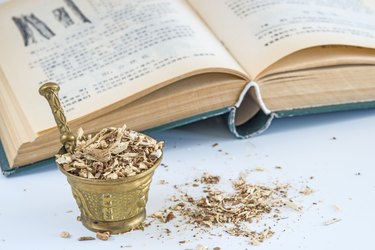
Gastritis, or inflammation of the stomach lining, can be caused by a variety of conditions, including alcohol consumption, smoking, medications, infection or autoimmune diseases. Gastritis usually results from a disruption of the mucous layer that protects the interior of your stomach from acid. Many people use herbs or other supplements to relieve gastritis symptoms, but you should see your physician if you think you have gastritis.
Classification and Severity
Video of the Day
According to "The Merck Manual of Diagnosis and Therapy," gastritis is often classified on the basis of the extent of injury to the stomach's mucosal lining. Using this classification scheme, erosive gastritis is more severe than non-erosive gastritis. Gastritis can also be classified by its location within the stomach or according to its chronicity. Treatments are aimed at protecting the stomach lining and, if possible, eliminating the underlying cause. No herbal therapy is approved for the treatment of gastritis, regardless of its cause.
Video of the Day
Marshmallow Root
Althaea officinalis, or marshmallow root, has traditionally been used to treat sore throats, skin rashes, burns, constipation, urinary tract infections, ulcers and other conditions where a soothing or protective action is indicated. According to the "Physicians' Desk Reference for Herbal Medicines," marshmallow root's active ingredient is a mixture of polysaccharides, or long-chain sugar molecules, that form mucilage when they are exposed to moisture. Marshmallow root is available in capsules, powders, syrups and teas. If you want to try marshmallow root for gastritis, check with your physician first.
Slippery Elm
The powdered inner bark of the slippery elm, or Ulmus rubra, has some of the same mucilage-producing properties as marshmallow root. Although not approved in the United States for treating any condition, slippery elm has been used for skin wounds, burns, rashes, sore throats, gout, rheumatism, gastritis, ulcers and heartburn. Providence Health and Services cites slippery elm's mucilage content as being potentially useful for people with gastritis. The sterols, tannins, amino acids, minerals and other ingredients in slippery elm are of unknown medicinal value. This herb is available in capsules, powders and teas.
Drug Interactions
Neither slippery elm nor marshmallow root has been shown to interact with any prescription drugs. However, because of their mucilaginous consistency, both of these herbs could conceivably interfere with the absorption of medications or other supplements from your intestine.
Herbal Gastritis Treatment
The emollient properties of marshmallow root and slippery elm may confer temporary relief from the abdominal pain, nausea and heartburn that often accompany acute gastritis, such as that caused by a drinking binge. Their benefit in asymptomatic gastritis, such as that associated with Helicobacter pylori infection, vitamin B12 deficiency or the use of certain medications, is unknown. Because gastritis is frequently caused by conditions that cannot be cured with herbal therapies, such treatments should not be used as sole remedies. Anyone who has gastritis or who is at risk for gastritis, such as smokers, heavy drinkers or individuals taking nonsteroidal anti-inflammatory drugs, should consult with a physician before using slippery elm or marshmallow root.